Green Agenda is very pleased to be publishing the following speech Alex Kelly gave on 27 June 2015 to the 2970 Degrees conference held on the Gold Coast.
Radically Re-Imagining the World as our Climate Changes
Good afternoon. It’s an honour to be here at such a dynamic event. And what a pleasure to be in such a beautiful and creative region of the country.I’d like to acknowledge the Yugambeh speakers and the elders of this land past and present. I’d also like to acknowledge the Arrernte people of Mbantua, Alice Springs – the place I call home. I don’t think the wisdom and resilience of Indigenous people can possibly be overstated – particularly when it comes to any discussion about the role of story, arts and culture in society.
I’d also like to shout out to Scott Rankin, Big hART and Naomi Klein, This Changes Everything two amazing thinkers I’ve been lucky enough to work closely with and who have had a profound impact on my own ideas.
Thanks to David Pledger for the wonderful invitation to be part of 2970 Degrees, to the City of Gold Coast for hosting me and thanks to the local artists who have shared their ideas with us. I’d also like to acknowledge my dear friend Hilary Furlong who has been an amazing friend and mentor to me.
Resistance and change often begin in art – Ursula Le Guin
I’ve worked at the intersection of arts, activism, film and community organising for over 17 years. All of my work is essentially exploring different ways of making change and understanding how change happens – from working in policy, to attending protests and blockades, to producing theatre, to running a karaoke caravan and making films. Perhaps in my late teens and early 20s this was a pursuit towards a fixed and singular answer – these days I actually find joy and reassurance in the fact that there is no silver bullet for changing hearts and minds – otherwise anyone could buy and deploy that mechanism.
Today I’m exploring the power of art and story in responding to the changes we are experiencing and will continue to experience as a result of the climate crisis – or what I like to think of as the climate opportunity.
I’d like to convey my deep respect for the research that has been done to reach global scientific consensus on climate change.
From these wonderful science nerds we know that the use of fossil fuels and the release of carbon into the atmosphere has led to an increase in the global temperature. We also know that this is changing our climate and weather systems drastically; we are seeing more extreme heat waves, floods, fires and super storms. We know sea levels are going to rise and we know that this is going to impact on our food systems, on plant and animal species and therefore the world as we know it. And we know that the Gold Coast will be one of the hardest hit areas from rising sea level.

We also know from the research conducted by the Carbon Tracker UK and many others that to avoid what scientists call “runaway climate change” we need to shift our consumption of fossil fuels to renewables, yesterday. We need to leave to oil in the soil and the coal in the hole.
Now I could show maps and graphs and extensively quote the science all day, but I’m not here to share that readily available information – suffice to say where we are at is increasingly off the charts – literally – this comes from NASA on Wednesday this week and shows that we’ve just had the hottest 5 months on earth ever recorded.

So why, when the science is in and it is so clear we need to respond are we not taking the urgent action required to respond to the crisis?
I think the answer lies not in a lack of information or data – it lies with the stories we have been telling ourselves and each other.
In This Changes Everything – which I’ll speak about further in a moment Naomi Klein writes;
Fear is a survival response. Fear makes us run, it makes us leap, it can make us act superhuman. But we need somewhere to run to. Without that, the fear is only paralyzing. So the real trick, the only hope, really, is to allow the terror of an unlivable future to be balanced and soothed by the prospect of building something much better than many of us have previously dared hope. – Naomi Klein
So how can art help us create a vision of somewhere to run to?
Harold Goddard says: The destiny of the world is determined less by the battles that are lost and won than by the stories it loves and believes in.
The arts can touch on meanings and mysteries that are otherwise difficult to articulate, ideas that are bigger than policy, carry more heart than statistics, or than media spin and cut to something deeper in our hearts than much of the short form splashy media of our time can.
Taking this idea of the role of story in shaping our destiny further – Edward Said asserts “Nations are Narrations” – the idea that the stories we include and exclude, the stories we repeat to each other and tell about ourselves and each other come to define us.
Words matter and the choices we make in framing issues changes how we understand these issue; we can see this with heartbreakingly clarity in the language used around asylum seekers and we see so many things reduced to pithy statements whether its “Stop the Boats” or “Windfarms are ugly”. We live in such a hyper saturated media culture that so much of information comes to us in reduced chunks and binary arguments and slogans. But these frames – the narrations we repeat and come to know – become part of how we see ourselves as a nation and the values and policies we develop to guide our world.
Advertisers, lobbyists, marketers, and data tracking analytics follow our buying habits, our online habits and create algorithms to target us specifically. Even environmental NGOs and campaigning organisations are studying behavioral psychology seeking to understand values driven decision making, our response to colour, ideas, brands, images. Everyone is vying to make the most powerful viral video, the quickest way to make us laugh, click, engage and to try to get our collective attention to make us buy or not buy or sign or divest or turn up for this event or boycott this event.
Even the Pope had something to say in his recent encyclical:
Efforts need to be made to help these media become sources of new cultural progress for humanity and not a threat to our deepest riches.
And yet there is no clear template for changing opinion or winning universal favour. The world of culture remains fluid and elusive. And it is precisely because culture remains ungrabbable and unpindownable that art and culture has such agency to helping us break with the old stories and imagine new possibilities.
And it is in this elusive space that we are able to avoid concretisation, as curator David Pledger calls it. In other words, art and culture give us a space to think differently – to think elastically, to think beyond the structures of the status quo and all that we are constantly told about what is possible and what the limits are.
For 10 years I worked with the brilliant arts and social change arts company Big hART who see story as an a driver of identity and policy change. Founded in Tasmania 24 years ago Big hART speak to the protective and empathetic power of story when they argue “It is harder to hurt someone if you know their story”.
Big hART’s first project GIRL explored the rise in domestic violence that correlated with the rise in unemployment when the local woodchip mill closed down. The project had a direct impact on the federal domestic violence policy – and the Big hART model of community devised and arts lead policy change was born. The company have now run projects exploring a wide range of social issues with more than 7500 people in over 45 communities. Projects run for 4-6 years. I could give an entire lecture on the sophisticated and wonderful Big hART model so I urge folks to look up more about them online.
For 6 years I was Creative Producer of the Ngapartji Ngapartji project, based in Alice Springs and working in Pitjantjatjara communities across the desert. We created the first online Indigenous language learning site in Australia, two touring theatre shows, over 75 short films, a feature documentary for the ABC and a campaign for and achievement of a national Indigenous languages policy.
The theatre production, starring Trevor Jamieson explored the impact of the British atomic tests at Maralinga on his family’s country. The play was performed in Pitjantjatjara and English and audiences were invited to learn Pitjantjatjatjara through the ninti site before seeing the show.
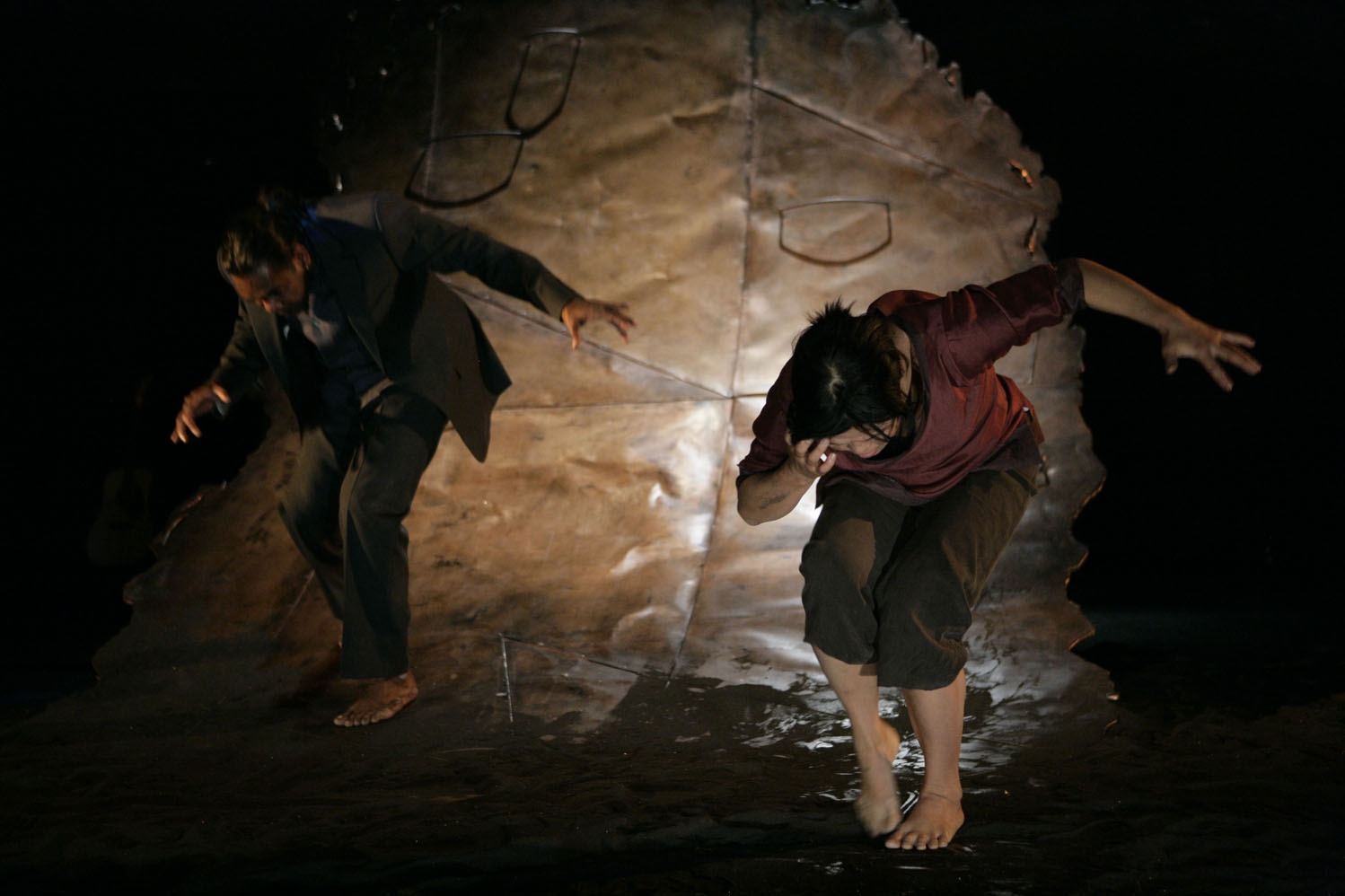
Ngapartji Ngapartji means I give you Something, You Give me Something and is a Pitjantjatjara concept of reciprocity and exchange.
I want to use two examples of change making that were achieved through this project. The project was designed to create change for individual participants, for the community in which we ran the project, for audiences and on a policy level. In the interests of time these two examples speak to encouraging a cultural shift with audiences and the creation of a specific policy.
The first was the seemingly benign and even daggy device of teaching Kata, Alipiri, Muti, Tjina – heads, shoulders, knees and toes – it had a more profound impact on audiences – who were for the most part non-Indigenous. In this small moment sending a gentle but profound message about how little non-indigenous people know about Indigenous language and culture. The idea that Australians know how to say hello at the Eiffel Tower, but not on Pitjantjatjara country at Uluru resonated deeply with people.
And this approach of hitting the heart to make policy was critical to our campaign to change indigenous languages policy.

We invited Peter Garrett to launch the Ninti site in Alice Springs when he was still the Opposition Arts Spokesperson. On the way to the launch we asked him to pop in to our office for a cuppa. We sat him down and a group of elders with Trevor on guitar sang him a Pitjantjatjara rendition of Ngura kampanyangka: Beds are Burning. It was a beautiful and emotional moment – there were tears – and from then on we had a champion for our languages policy, I had the mobile number of Garrett’s chief of staff and the first ever national Indigenous language policy was launched 3 years later. This policy has ensured that indigenous languages were included in the Closing the Gap policy, the national cultural policy and the national education curriculum.
Now not every politician has a back catalogue that you can exploit to make them cry – but the point is that the arts can communicate something much more profound than a policy paper. We had those too – but it was the art that opened the doors to a more authentic emotional connection with the issue.
An important note here is that change doesn’t come from one singular moment or action alone, we often remember key moments in strikes, protests and political moments when we look back to understand how change happened. Ngapartji Ngapartji did not exist in a vacuum. It was produced alongside Gurrumul’s music going mainstream and Ten Canoes entering consciousness and was of course building on centuries of indigenous activism and deep work by linguists and language speakers such as the amazing Queensland language activist Faith Baisden a Yugambeh woman who was part of the policy delegations to Canberra and is behind many wonderful projects from First Languages Australia to Binibar Books.
It is easy and tempting to be able to reduce understanding of how change happens to a singular moment one approach or theory of change – like Garrett crying, which of course was powerful – but I think there is great strength in the fact that we can’t do that and that there is a more complex social fabric and culture at play.
It is in this complex space on a global scale that This Changes Everything is seeking to reframe the climate change conversation and break down silos between social movements.
This Changes Everything
So here we are. Facing the climate crisis – something so big and so impactful we almost can’t conceive of the changes to come.
But in crisis there is also opportunity – to remake, to reimagine and to redefine our world.
Something breaks in crisis – the veneer is torn away, the terrain can shift rapidly and all of a sudden everything that previously seemed solid, reliable and safe no longer appears the same. We see this when natural disasters strike or when members of our family become sick. It is in our response to disaster that we can make a choice; we can try and rebuild the old systems – even if we can see that they failed us – or we can take a leap – seize the moment to create something new, something better than what we had before.
We all know that people can be wonderful to each other in times of crisis. When floods sweep through we cook for each other, share blankets and clothes and we find a warmth in community that is often missing in our day to day lives. Disaster, strangely, often brings out the best in us and I think climate change can be just this kind of disaster.
This is Occupy Sandy in NYC – disaster relief coordinated by the Occupy movement.
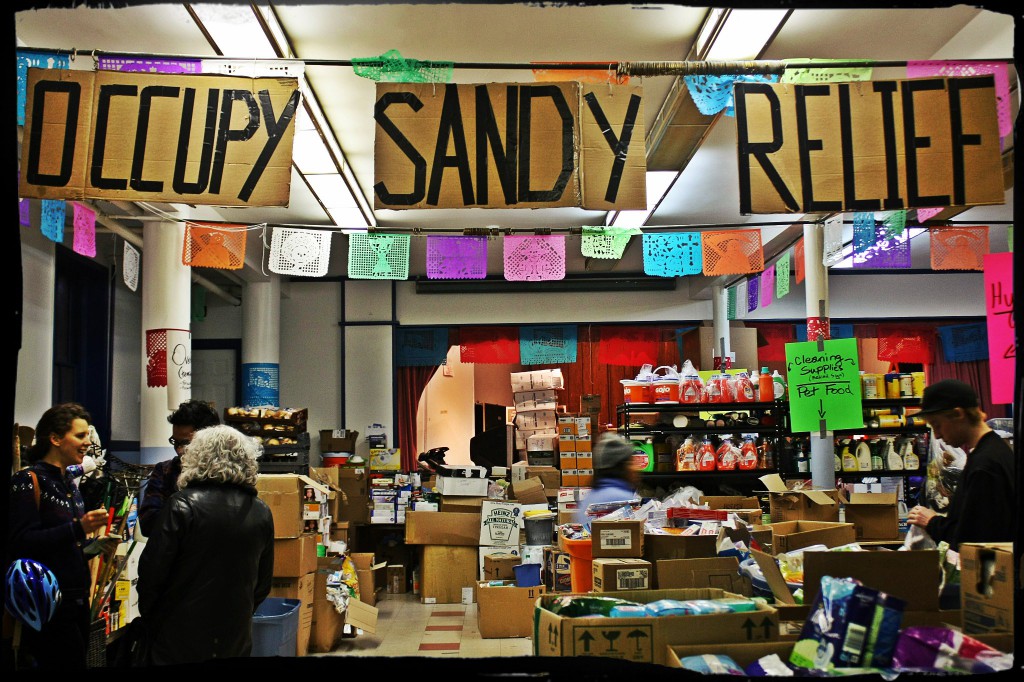
This Changes Everything is a non-fiction book by Naomi Klein and companion documentary film directed by Avi Lewis.
This project is still very much unfolding so I can’t speak to the full impacts yet – the book has now been published in another 8 languages with many more to come and we plan to launch the film in September and use its distribution to support the movements mobilizing around the Paris UN climate meeting COP21.
The book and film argue that we have been unable to respond to the crisis with the urgency the science demands because that requires a shift away from an economy based on endless growth and extraction. And there are powerful interests and ideology invested in maintaining that status quo.
I work on this project as an “impact producer”. This is a new termed coined by the fabulous BRITDOC film org in UK which speaks to the role of producing the distribution strategy of a book, film, theatre show etc to make an impact on a particular issue. Distribution is the bit that most artists, writers and academics are too exhausted or have no longer got any dollars in the pot to fund – but the critical role of getting the work in front of audiences and the right audiences to make change.
For This Changes Everything that means supporting the work of social movements around the world, advancing conversations about the next economy and reframing the way we think about climate change.
Unlike Ngapartji Ngapartji we haven’t set a singular policy change objective for this project – we are seeking to at once change the conversation around climate change – away from being a green issue – and to try and bring social movements working on different issues together to build power in stronger coalitions to take on the likes of Abbott and the deeply vested interests of the resources sector.
We believe it’s not books and films that change the world but people – working together in social movements. So a lot of my work is about figuring out how to put power of a book and film to the service of movements.
We see how hard it is when groups try and put out spot fires in isolation, when the disability sector defend its commissioner, the environmental groups are fighting to save the RET, refugee advocates are fighting the appalling border policing, indigenous people are defending remote communities and artists are scrambling to defend the Australia Council – just as the logic of these cuts on the public sphere and the environment are connected – so must be our response to it.
Movement building sounds good on paper. But there are vast and contested theories about how you achieve social change and build the power of social movements. Activists can be deeply critical – and often downright hostile to each other, tearing up each other’s tactics & strategies (we do direct action, we do policy, we do community development) and approaches to change making. This is a huge stumbling block – a healthy movement ecology is one with respect for multiple tactics and can still find ways to work together. So a lot of my work is about convening conversations between activists to encourage them to find their common interests and find ways to collaborate.
I want to take a moment to mention the role of arts in the People’s Climate March which saw 400k ppl on streets on NYC a week after the book was released. The march adopted the slogan “To change everything we need everyone” which has been picked up around the world. It was also a march that looked like New York – everyone was represented.
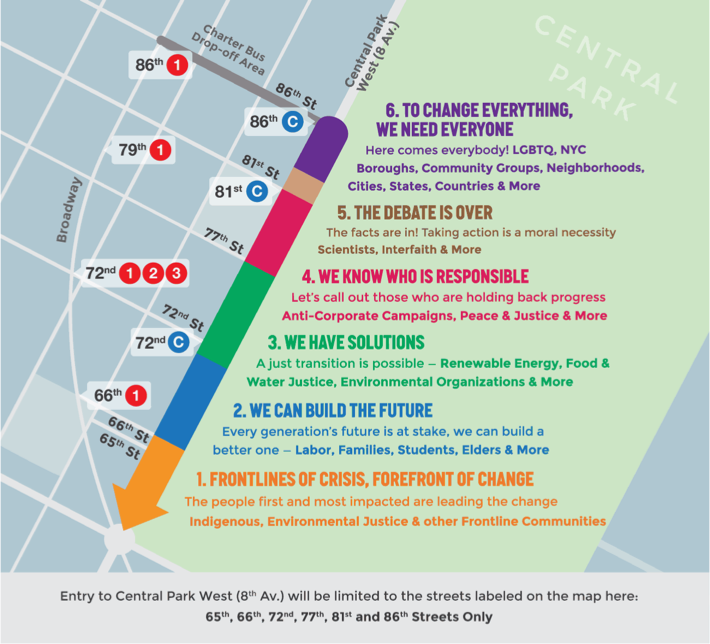
As artists and activist Gan Golan notes Artists were not just “cake decorators” on this march – they didn’t just make it look pretty, yes there were design comps and a puppet building warehouse etc, but artists were actually closely engaged in the design and make up of the march itself, the 3 mins of silence ritual which I found so completely profound was devised by artists.
Increasingly the way in which events and marches are organised is being referred to as “movement choreography” and we can see an increase in arts thinking applied to movement organising. In the lead up to the Paris COP21 I am paying keen attention to the work of Laboratory for the Insurrectionary Imagination, Climate Games, Beautiful Trouble, COAL and Cape Farewell projects to see how they will be responding to the event.
We have been holding movement convenings around the world to try and encourage greater collaboration between issues and organisations. This is a picture from an event we did in the Bay Area, California – where we experimented with trying to get people who didn’t know each other in a room in a highly saturated activist hub, and succeeded.
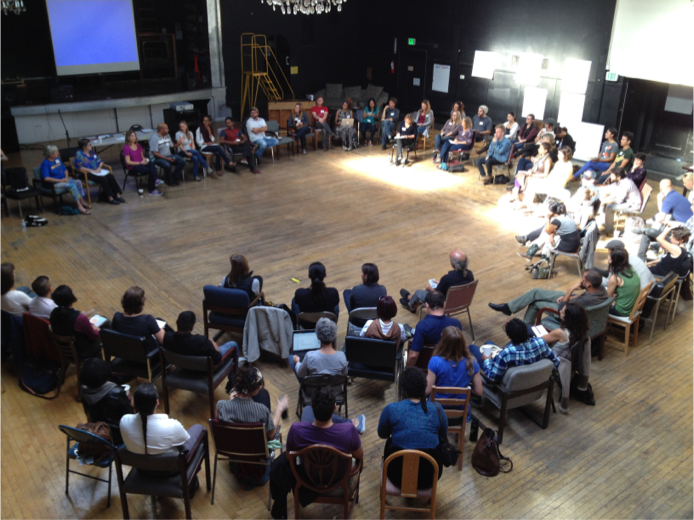
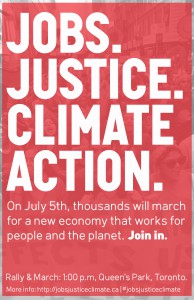
And now in Canada we have kicked off an exciting new coalition – where the Shock to Shift convenings we held in May have lead to the launch of a new Jobs, Justice & The Climate coalition which is lead by indigenous people, immigrants rights and activists and labour organisers.
Now I never expected that I would be drawing on the Vatican to bring home my arguments – but I do think this is a time for surprise transformations!
Naomi heads to Rome next week, invited to the Vatican by Cardinal Peter Turkson, who is the person widely understood to have helped draft the encyclical. He appreciates This Changes Everything because it makes the connections between the economic system and climate change and Naomi has been invited to speak at a major press conference elaborating on that.
When it comes to reframing climate change there is a serious battle of the story underway. We know from research from groups like The Australia Institute how the governments gives billions each year in subsidies to the fossil fuel industry and we know from research from writers like Clive Hamilton that the fossil fuel industry is paying millions to lobbyists, PR firms and in political donations to influence the frames of the debate and the policy programs that could impact on their business as usual.
And perhaps in this context it may seem impossibly idealistic – a battle of David and Goliath proportions to suggest that filmmakers, painters, sci-fi writers, theatre makers and poets could possibly tip the scales of change when the vested interests seem so powerful tipped against us.
There is no shortage of post apocalyptic narratives of dystopian corporate controlled futures – from the Hunger Games, to Mad Max Fury Road to Snow Piercer, where increasingly resource wars are the focus of the genre which has been coined “cli fi” or climate fiction.
We don’t need more fear-based stories of rising seas and hotter summers and drowning polar bears and killer storms and bushfires. We need work that triggers conversations, that makes us think about other possibilities – ideas beyond capitalism, beyond closing our borders, towards a more inclusive, more just, wiser and more creative world. A world that we can all see ourselves in and that we are excited to engage to fight for.

Of course one book and film alone – however brilliant our strategy – is not going to tip the scales on this. But alongside many other books and films, Frackman, Yes Men, Gasland, Oryx and Crake, Flight Behaviour and the Pope’s encyclical, the court decision in Holland on emissions this week, the protest against oil sponsorship of the art of groups like Liberate Tate – pictured here, the powerful Biennale boycott, the amazing divestment movement, the campaign to save the reef and people blockading to keep out the gas companies – by our powers combined and our stories retold we will make the change.
We are the leaders we have been waiting for
Detroit based activist Grace Lee Boggs turns 100 this weekend and she nails it when she says we are the leaders we have been waiting for. I think when we look to not only the current government, but the lack of leadership on climate action around the world we know this to be true.
I think that it is possible to at once boldly face the facts – recognize the vested interested, the entrenched power, the impending and increasing storms and disasters we are going to face, but tell new stories – about an economy that does not rely on endless growth and extraction from the planet that we rely on or the exploitation and marginalization of people.
There are not many times in history where you get a chance to rewrite the story and this is one of them.
One of Naomi Klein’s ideas which gives me tingles when I read it or hear her speak to it is the notion that in building a more just world can finally address the wounds that cleave our world – those of centuries of colonial extraction and exploitation – by shifting our worldview and our system to reflect interconnectedness with country and with each other.
Australia is home to the longest continuing cultures on earth. We live in Indigenous nations whose stories & culture go back over 50,000 years. These stories, the worldviews of the first Australians speak to an interconnectedness, sophisticated kin systems, land management and a vast and rich spirituality. We can draw on this wisdom – these ancient stories and their contemporary expression in the imagining of a better world.
This vision – of creation, of justice and of healing – makes my heart flicker with a feeling of both recognition and of cautious hope.
And with this feeling of possibility kindled in my chest and somewhere deep in my gut I appeal with urgency for the artists and storytellers of our world to take up the challenge to create work which helps us see the many other possibilities for our future, to fracture the idea that the status quo is fixed and to provide us with visions of richer possibilities, contestable futures, new national narratives and new ways of seeing ourselves and each other.
Bob Hunter says big change looks impossible when you start and inevitable after you’ve finished.
Thank you and I so sincerely look forward to continuing this conversation with you all.
If you liked reading this and want more, please subscribe and donate to Green Agenda

Thanks so much for this Alex. I was on a panel at Bendigo Writers Fest yesterday talking about the role of writers in climate change, and we talked a lot about our role in highlighting the problems but not nearly enough about how we can also present goals to work towards as well as things to actively avoid. If only I’d read this before the panel! Anyway, thank you. You might also be interested in a book I have coming out soon about surviving climate change http://www.survivingclimatechange.net/about/. Cheers, Jane.
Bravo on this great speech Alex! You’re doing essential work and with a really constructive approach. All best, Paco